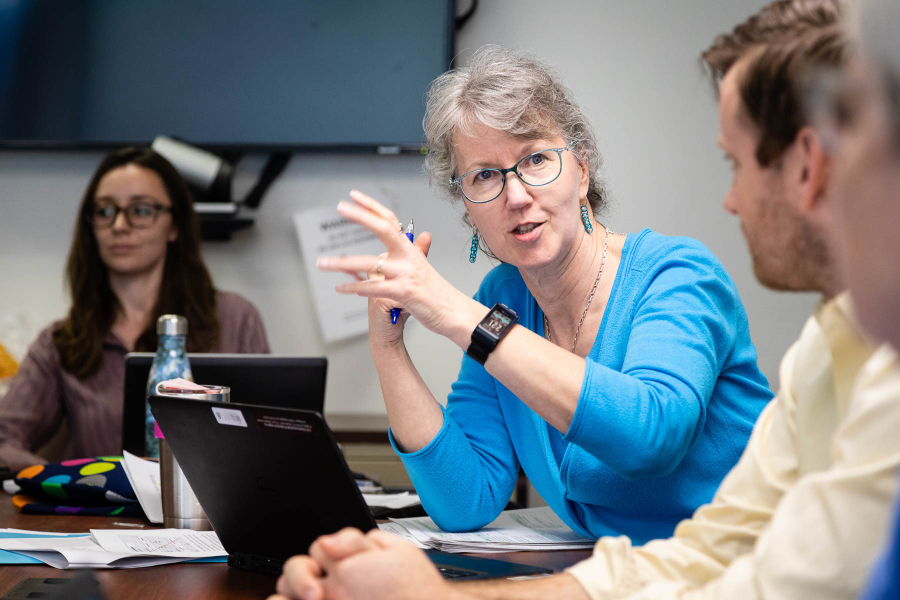My Clean Water Story: Doreen Vetter
Doreen has been a passionate advocate for science-based decision-making

Growing up in the Finger Lakes region of New York, my days were spent exploring the woods near my home. Some of my earliest memories are of the hours I spent in nature and most of those memories involved water. Whether sitting by a gurgling creek with my packed lunch, ice skating in the winter on the frozen lakes, fishing in the 1000 Islands or swimming in Canandaigua Lake, water was an important part of my world. My family later moved to Ohio, where we floated down lazy rivers in inner tubes, and I taught canoeing at an outdoor summer camp during high school.
During my undergraduate days at the Ohio State University, I continued to gravitate toward water. I spent one summer and fall working as a creel clerk—conducting angler surveys—for the Ohio Department of Natural Resources at Knox Lake and, during my time off, spent hours observing great blue herons in their rookery at the north end of the lake. After graduating, I moved to the southern shore of Lake Erie. Not long after that, I found myself traveling back and forth between Columbus and Sandusky, Ohio, fortunate to be studying wetland science from Dr. William J. Mitsch, who quite literally wrote the book on wetlands! My research entailed studying the differences between coastal Lake Erie wetlands that were connected to the lake ecosystem and those that were separated from the lake with large earthen dikes for waterfowl management purposes.
During that time, the news was filled with the ongoing debates in Washington, D.C. about which wetlands could be considered waters of the U.S. and therefore worthy of protection under the Clean Water Act. I found myself frustrated that politics and not science was driving the discussions on this issue.
Shortly afterwards, I learned of a fellowship to work in Washington, D.C. for a year. I applied and was selected as a Knauss Marine Policy Fellow working at the once-fledgling National Estuary Program in the Office of Water at the U.S. Environmental Protection Agency (EPA). I intended on staying for a year and making connections that would help me find a wetlands position elsewhere in the country, but after living in Maryland, halfway between Washington, D.C. and Annapolis, my passion for this beautiful region was ignited and I never left.
When the fellowship ended, I saw an opportunity to realize my interest in building connections between wetlands policy and science, and began my federal career in EPA’s National Wetlands Program. My focus was working with the Wetlands Research Program in Corvallis, Oregon and serving as a liaison between the researchers and policy makers to drive long term research directions and help bring sound science into the national program. My dream job!
Living in Maryland, I quickly developed a connection with the Chesapeake Bay community. I began kayaking on the local rivers and streams, found volunteer opportunities to educate others on the importance of wetlands at Jug Bay National Estuarine Research Reserve and developed Earth Day programs for my kids’ school. Meanwhile, the EPA office supporting the protection and restoration of the Chesapeake Bay and watershed in Annapolis was ever present in my mind. I was eager to work in my local waterways, where I lived and played. When an opportunity to join the Chesapeake Bay Program presented itself, I jumped and never looked back!
During my time at the Chesapeake Bay Program, I was fortunate to work side-by-side with some of the most dedicated and passionate people I will ever meet. We collaborated on a wide range of projects that improved coordination between different restoration activities, enhanced information-sharing and decision-making across the partnership, and fostered greater transparency and accountability of our progress towards meeting the goals of the Chesapeake Bay Watershed Agreement.
I’m proud of the work I have been able to accomplish and contribute to as part of many different collaborative teams. As a shy kid growing up in rural NY, I couldn’t foresee the work I would later be involved in, but one thing is certain, I wouldn’t be the person I am without the lessons provided by the woods I roamed and the creeks I waded in. All children deserve to grow up where the waters are clean and natural areas are accessible. In that way, they too will have an opportunity to thrive and continue the cycle of caring for our environment.

Comments
There are no comments.
Thank you!
Your comment has been received. Before it can be published, the comment will be reviewed by our team to ensure it adheres with our rules of engagement.
Back to recent stories